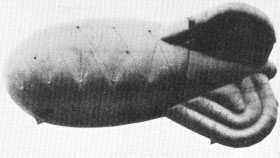 Click
for Site Directory
Click
for Site Directory
921 Squadron and the Seaforth Balloon Barrage Cylinder Fire 1941
There were many dramatic incidents during WWII on these islands. Where people carried out brave acts to rescue people or minimise damage they were often put forward
by the Regional Commissioner for a Civil Defence Gallantry Award with a recommendation for a civil award such as B.E.M. or even George Cross. Thousands were recommended
and the reading of the events that led to the recommendation go to show the determination of the people to risk everything to save life, limb and property after and during
Nazi attacks. Many were put forward but the Committee on such awards was not one that gave these awards away lightly. The Interdepartmental Committee on Civil Defence
gallantry awards, consisting of Home Office and Ministry of Home Security representatives, was responsible for considering all recommendations from local sources and
subsequently submitting them with its own recommendations to Lord Chatfield's Committee at the Treasury. This committee was the final arbiter in deciding gallantry awards
for the armed forces, Civil Defence, Fire Services, Police and civilians.
On the night of 4th/5th May 1941 on site 26 at Lime Grove, Seaforth, Nr. Liverpool, a stick of bombs dropped in the Seaforth area at around 1.15 hours. One of the bombs fell
close to a stack of hydrogen cylinders which were covered by a tarpaulin.
When the bomb fell 855242 Corporal John Clegg was driving the winch and was severely injured in the right temple and head from bomb splinters.
When the bomb fell, 1130718 Aircraftman 2nd Class F. E. Lack was standing at the central anchorage with Aircraftman 2nd Class Kershaw and both were blown over by the blast.
Aircraftman 2nd Class Kitchener and 855146 Aircraftman 1st Class John Charles Swainson Wolff came out of the air raid shelter. The winch was out of control.
Adjacent to the site was the Police Motor Patrol Yard, Peachgrove Garages, two officers, Constable Fred Crosby, age 34, and Constable Rylance, age 28, heard the cries for help
from Aircraftman 2nd Class Kitchener, who shouted: “Corporal Clegg on the winch is hurt!”. Henry Abel Bates, age 47, lived at 8 Lime Grove and arrived on the site with his son,
Alfred Bates and a Mr Fletcher Kelly. He was a Timber Worker by trade but had been on Fire Watch duty that night.
Constable Rylance and Constable Crosby assisted by Fletcher Kelly removed the inured Corporal Clegg. They sent for Nurse Carberry of 3 Lime Grove and rendered basic First Aid
and then noticed that the tarpaulin over the cylinders was ablaze.
Constable Crosby shouted to those dealing with Corporal Clegg: “Get him further away from the danger!”. As Corporal Clegg was being carried away, Constable Crosby shouted Alfred
Bates:” Look at that hydrogen bottle” and “I’ll soon fix that!”. He the shouted to Henry Abel Bates:” Come on Harry let’s chance it and drag it away”. Henry Abel Bates lifted up
the burning cylinder by the neck while Constable Crosby tied some rope around the neck of the cylinder. Constable Crosby, Henry Abel Bates and Alfred Bates then dragged the
burning cylinder away.
Constable Rylance stayed with Corporal Clegg while Constable Crosby and Fire Watcher Henry Abel Bates assisted by a RAF man dragged the tarpaulin off the cylinders, but they
noticed that one of the cylinders were on fire. The R.A.F. man shouted to Crosby: “Get away from here- if that goes up we shall all be gone!”.
Constable Crosby shouted to those dealing with Corporal Clegg: “Get him further away from the danger!”. As Corporal Clegg was being carried away, Constable Crosby shouted to
Henry Abel Bates:” Come on Harry let’s chance it and drag it away”. Henry Abel Bates lifted up the burning cylinder by the neck while Constable Crosby tied some rope around the
neck of the cylinder. Constable Crosby, Henry Abel Bates and Alfred Bates then dragged the burning cylinder away.
Constable Crosby ran a hosepipe from the Police Yard and assisted by Constable Nash succeeded in extinguishing the flames. Corporal Clegg was conveyed to hospital but died
from his injuries.
Fred Crosby had been an Acting Sergeant at Seaforth since the Blitz had begun on 2nd May.
He along with Henry Abel Bates was recommended by the Clerk to Lancashire County Council for the George Cross. Sadly, despite the risks they took that night the Committee
decided that neither of the men should receive the George Cross
855242 Corporal John Clegg, age 31, was born in 1910 and was the son of Albert and Margaret Clegg, of Liverpool and husband of Jennie Clegg, of Aintree, Liverpool.
He lived at 9 Sedburgh Avenue and at Probate he left his wife £606.
Henry Abel Bates was born in Bootle, Lancashire in 1894 and in 1911 lived at 228 Litherland Road, Bootle with his parents, Henry and Jane Bates.
P.C. 940 Fred Crosby was born 31st October 1906 and in 1938 was single and lived at 5 Mount Street, Brierfield,
P.C. 488 Frederick Jason Rylance was born 31 March 1913 and in 1938 lived at 23 Parker Avenue, Crosby, Lancashire with his wife Mary who was born 6th January 1916.